Qatar’s Foreign Minister In Iran To Follow Up On Nuclear Talks
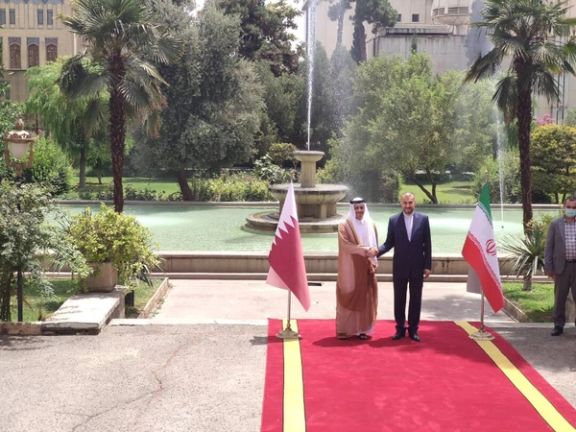
Iran says Qatar’s Foreign Minister Mohammed bin Abdulrahman Al Thani arrived in Tehran on Wednesday to discuss the latest development on kickstarting the nuclear talks.

Iran says Qatar’s Foreign Minister Mohammed bin Abdulrahman Al Thani arrived in Tehran on Wednesday to discuss the latest development on kickstarting the nuclear talks.
Foreign Minister Hossein Amir-Abdollahian officially welcomed his Qatari counterpart on Wednesday. In a press statement earlier in the day, Foreign Ministry spokesman Naser Kanani said that Al Thani, who is also the deputy prime minister, is scheduled to hold meetings with Amir-Abdollahian and other officials.
Noor News, a website close to the Iranian Supreme Council of National Security (SNSC), also said Al Thani will also hold a meeting with SNSC secretary Ali Shamkhani.
According to Kanani, the Qatari diplomat and his Iranian counterpart will also review bilateral ties, as well as regional and international issues of mutual interest.
Al Thani and Amir-Abdollahian held a phone call late in June after the Tehran-Washington proximity talks hosted by Doha, which ended without any progress.
Brokered by the European Union, the two-day talks in the Qatari capital last week were aimed at breaking a months-long impasse in negotiations to restore the Joint Comprehensive Plan of Action (JCPOA), but ended without any tangible results.
On Sunday, Al Thani also discussed the latest status of Vienna talks with US Secretary of State Antony Blinken.
Tuesday evening, Amir-Abdollahian and European Union foreign policy chief Josep Borrell held a phone talk that focused on the nuclear agreement, after similar discussions between the Iranian foreign minister and his Omani and French counterparts.
Earlier on Wednesday, Amir-Abdollahian reiterated, “Agreement is possible only based on mutual understanding and interests,” adding that Tehran remains “ready to negotiate a strong and durable agreement.”

Following the failure of Tehran-Washington proximity talks in Qatar last week, the US State Department says there is no plan for another round of talks for now.
Answering a question by Iran International’s correspondent Samira Gharaei and another reporter at the Tuesday briefing about when the US would conclude that there is no hope for success in the nuclear negotiations, State Department spokesman Ned Price said, "The reason it's impossible to put a timeframe is it isn't based on a political decision, but on a technical assessment of Iran's nuclear program versus non-proliferation benefits of the JCPOA."
US officials have said Iran already has accumulated enough enriched uranium to produce a bomb and critics wonder when the current situation would reach a point for the United States and its allies to walk away for the talks and adopt a different approach. The administration in January had said that the last chance for Iran was sometime at the end of February, and then negotiations broke down in March.
About US Special Envoy for Iran Robert Malley’s remarks earlier in the day on US waiting for an answer from Tehran, he said, “The answer that not only the US is waiting for, but also that our European allies are waiting for is a decision on the part of the Iranian government to fully return to compliance with the JCPOA.”
“It is not clear to us, based on what we have heard from the Iranians indirectly; from our European allies; that they have made that political commitment. There has been a deal on the table that is more or less finalized for several months now,” he added.
Price said, “In recent weeks and recent months, rather than make that political commitment to return to compliance with the JCPOA, Iran has consistently introduced extraneous demands that go beyond the four walls of the JCPOA.” “To introduce anything that goes beyond the narrow confines of the JCPOA suggests a lack of seriousness, a lack of commitment.”
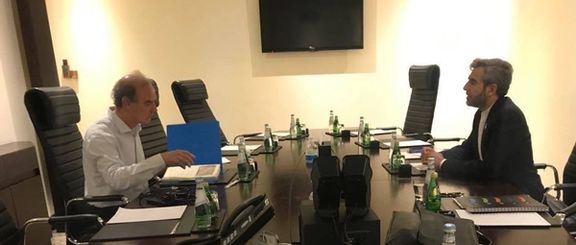
He highlighted, “We are at a point where a lack of forward momentum, a lack of progress is tantamount to backtracking,” adding that "Current assessment of experts and intelligence community is that the Iran agreement on the table right now is far preferable to where we are now.”
The US has said that that the West made an offer to Iran in December after nine months of talks in Vienna and the ball is in Tehran’s court.
Malley told National Public Radio Tuesday that last week’s Qatar talks between Tehran and Washington had been a waste of time.
Malley said the European Union – whose leading official Enrique Mora acted as a go-between in Qatar – had “put on the table very detailed outlines of what they think a fair outcome would be, and we’ve said we’re prepared to take that deal; the party that has not said yes is Iran.”
Iran’s Hostage Taking Policy
In response to a question about Belgium's controversial treaty on the exchange of convicts with Iran and whether the US is pursuing a different path to handle the Islamic Republic’s hostage policy, Price said the US has a near term goal when it comes to its citizens detained in Iran as well as a long-term goal.
“Our near-term goal is to see to it that those who are at the present moment held unjustly and wrongfully... are released.” The longer-term goal, he said, “is to create and reinforce a norm against this horrific practice; to see to it that the international community speaks with one voice and acts together.” He added that the US is working with allies to lay the ground to achieve this.
Price went on to say the US is monitoring several “egregious cases of Europeans and dual citizens” held in Iran such as Swedish-Iranian academic Ahmadreza Djalali, adding that “we echo concerns from UN experts that the situation... is truly horrific.”
Numerous people and groups from around the world have warned about the prisoner exchange treaty between Belgium and Iran, warning Belgian politicians against “giving the green light to state terrorism," and demanding that the bill be abandoned.
The treaty by the Belgian government that parliament is debating for approval could lead to the release of Assadollah Assadi, an Iranian diplomat serving a 20-year prison sentence in Belgium for “attempted murder and involvement in terrorism” for his role plotting to bomb a gathering of the exiled opposition group Mujahedin-e Khalq Organization (MEK) near Paris in 2018.
The committee was due to vote on the bill on Tuesday but adjourned the session until Wednesday after nearly four hours of debate. It is likely to be put before the full 150-member chamber on Thursday.
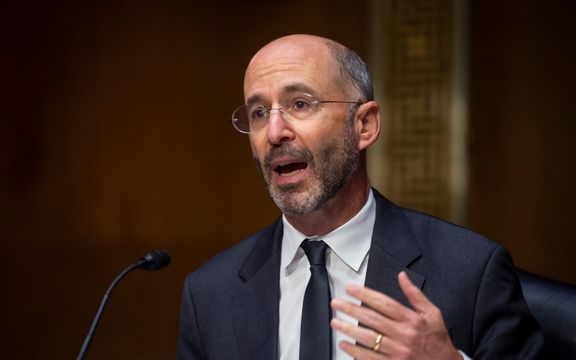
The US special envoy for Iran Robert Malley told National Public Radio Tuesday that last week’s Qatar talks between Tehran and Washington had been a waste of time.
“The European Union – in its role as coordinator – wanted to try one more effort, at least one more effort, and so they invited both delegations (from Iran and US) to meet them in Doha in the hope that Iranians would show something, some willingness to get to yes,” said Malley, who led United States negotiators in Doha, in an NPR interview Tuesday.
Malley said the European Union – whose leading official Enrique Mora acted as a go-between in Qatar – had “put on the table very detailed outlines of what they think a fair outcome would be, and we’ve said we’re prepared to take that deal; the party that has not said yes is Iran.”
Malley said Iranian negotiators “seem at this point not capable of providing answers,” making the indirect, or ‘proximity’, talks “more than a little bit of a wasted occasion.”
“The discussion that really needs to take place right now is not so much between us and Iran, although we're prepared to have that,” Malley said. “It's between Iran and itself…They need to come to a conclusion about whether they are now prepared to come back into compliance with the deal.” He suggested Tehran had not made the “fundamental decision” as to whether they wanted to renew the 2015 deal, the JCPOA (Joint Comprehensive Plan of Action), which the US left in 2018.
New demands
Malley said Iran had in Doha added new demands, though he gave no details, and he gave no deadline over the negotiations, which are expected to resume after President Joe Biden’s mid-July Middle East trip.
Questioned over Iran’s growing stockpile of highly enriched uranium, Malley said Tehran was “a matter of weeks” from having enough for a bomb. “It would be something that we would know…and we would react quite forcefully, as you can imagine,” he said.
Malley reiterated the Biden administration’s view that “a very dangerous situation” had been created by President Donald Trump leaving the JCPOA in 2018, when the agreement was “working.”
“They’re much closer [now] to having enough fissile material for a bomb,” Malley said. “To our knowledge they have not resumed their weaponization program…but we are of course alarmed, as are our partners, about the progress they’ve made in the enrichment field and that’s why we think getting back to the deal is in our non-proliferation interest. We think it’s in their interests because they’d get sanctions lifted, but of course that’s an assessment that they alone have to make.”
Brokered by the European Union, two-day talks in the Qatari capital aimed at breaking a three-month impasse in negotiations for attaining a mutual return to compliance of the JCPOA, but both sides left disappointed.Tehran blames Washington’s refusal to guarantee Iran’s effective access to world markets, as required by the JCPOA, for lack of progress in the proximity talks, but says agreement is possible if the US is “realistic.”
The EU foreign policy chief Josep Borrell, who arranged the Qatar talks on a visit to Tehran June 25-6, tweeted Tuesday, after a phone call with Iranian foreign minister Hossein Amir-Abdollahian, that “decisions are needed now” as the “political space to revive the JCPOA may narrow soon.”
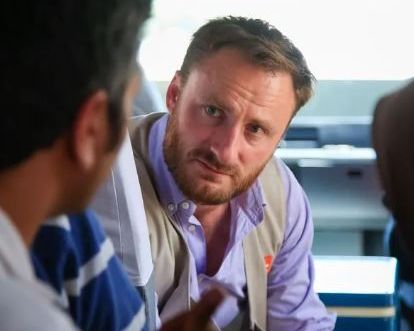
Brussels has confirmed that Iran has been holding a Belgian man for the past four months under “espionage” charges as it weighed a controversial prisoner swap treaty with Tehran.
Belgium’s Justice Minister Vincent Van Quickenborne said Tuesday the man was seized in Iran on February 24 and has been in “illegal” detention since.
He did not identify the man but he was most likely referring to Olivier Vandecasteele, a 41-year-old Belgian aid worker who has served in various international humanitarian organizations since at least 2006.
The announcement by the ministry came after Iran International revealed the identity of the Belgian national, who had previously worked in India, Afghanistan, and Mali and later became the director of Norwegian Refugee Council’s Iran operations in 2015 and assumed the same position with Relief International in Iran in 2020. On July 2, an informed source had told Iran International that at least two Belgian citizens are currently in prison in Iran.
A draft law proposed by the Belgian government to the parliament could put the seal of approval on an agreement with Iran, which could lead to the release of Assadollah Assadi, an Iranian diplomat serving a 20-year prison sentence in Belgium for planning a terror attack in Paris four years ago.
Numerous people and groups from around the world have warned about the imminent perilous consequences of the prisoner exchange treaty, calling “the green light to state terrorism” that only emboldens the Islamic Republic.
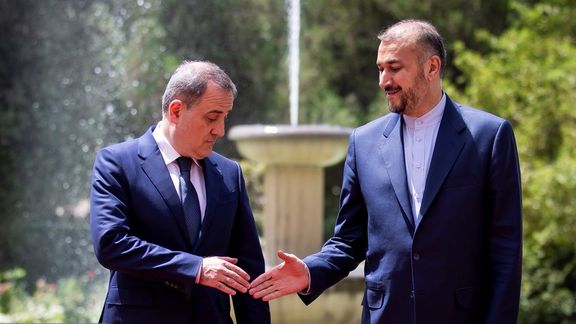
Foreign ministers of Iran, Azerbaijan, and Turkey are to meet in Tehran soon in a regional format, Iran’s foreign minister announced on Monday.
Hossein Amir-Abdollahian made the announcement at a joint press conference with his Azerbaijani counterpart Jeyhun Bayramov who arrived in Tehran for an official visit Monday.
Iran’s top diplomat also said that high-level experts from Azerbaijan, Armenia, Georgia, Russia, Iran, and Turkey will also be meeting soon in the '3+3' format and their meeting will be followed by a meeting of the foreign ministers of these countries in Tehran or another Iranian city.
The dates of the two summits, as well as Azerbaijani President Ilham Aliyev's planned visit to Tehran, are to be decided during the Azerbaijani foreign minister’s visit, Turkey’s official news agency Anadolou reported Monday.
Bayramov said at the press conference that Baku supports Iran's suggested formats, including the 3+3 format, for the summits.
During the press conference, Amir-Abdollahian said “misunderstandings” between Tehran and Baku have cleared up in the past ten months.
Tensions rose between Iran and its northwestern neighbor in September 2021 after Azerbaijan's arrest of Iranian truck drivers and its joint military drills with Turkey and Pakistan, which began September 12 in Baku, about 500km from the Iranian border. This was followed by Iranian military exercises near the Azeri border.
Tehran also has serious concerns over growing relation between Baku and Tel Aviv in recent years. Israel is one of Baku’s major oil customers and has reportedly been allowed to use Azerbaijan’s airbases. The topic was not brought up in the press conference Monday.
The Iranian foreign minister stressed the importance of territorial integrity of Azerbaijan and added that Tehran “reaffirms its support for the peaceful settlement of the ongoing Karabakh conflict based on the well-known principles of the international law."
“We are prepared as before to continue our support and assistance in this regard, so that the remaining issues [between Azerbaijan and Armenia] would be resolved on the basis of respect for the territorial integrity and sovereignty of the involved parties and through political dialogue,” he said.
Armenian Prime Minister Nikol Pashinyan and Azeri President Ilham Aliyev announced last month that the two countries will set up border security and delimitation commissions to settle their decades-long conflict over the Nagorno-Karabakh region.
Amir-Abdollahian described energy and transit as "two key areas of cooperation" between Tehran and Baku and said the two sides will sign their final agreement on power swap during Iranian Energy Minister Ali Akbar Mehrabian’s upcoming visit to Baku while his Azeri counterpart told reporters that the volume of trade between Tehran and Baku increased by 30 percent in 2021 but could still grow more.
According to Azerbaijan’s Apa TV, Bayramov also met with the Iranian President Ebrahim Raisi and discussed joint projects in the fields of energy and transport and emphasized the importance of creating new transport links between Azerbaijan’s East Zangezur economic region and the Nakhchivan Autonomous Republic through Iran as part of the north-south transit corridor.
The settlement of the conflict and delimitation of their borders has huge impacts on Iran’s northwestern transit roads and trade. Iran’s border with Azerbaijan increased by 132-kilometer after Azerbaijan’s victory against Armenia in the Nagorno-Karabakh War and a Russian-brokered deal between Azerbaijan and Armenia in November 2020.
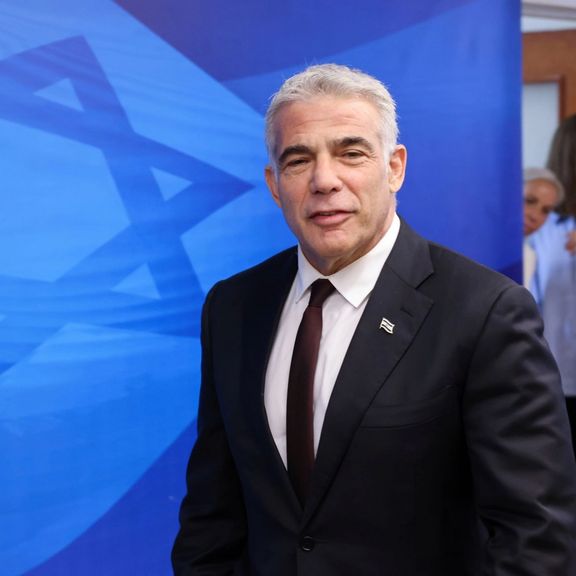
Israeli Prime Minister Yair Lapid will press French President Emmanuel Macron to be tough on the Iranian nuclear negotiations, during his trip to Paris Tuesday.
He will also tell Macron that the Tehran-backed Hezbollah group is "playing with fire", Reuters quoted an official as saying.
Lapid's visit to France, his first abroad since becoming caretaker premier last week, is also a chance to flex diplomatic muscles as Israelis gear up for a snap election in November.
France is among world powers trying to revive a 2015 nuclear deal, the JCPOA, with Iran that the previous US administration quit, and which Israel opposed, deeming its caps insufficient.
"The French are very, very active on the Iranian issue," a senior Israeli official told reporters.
"It is important for us to make our case ... Israel opposes a return to the JCPOA (2015 nuclear deal). In the same breath, we do not oppose a deal. We seek a very strong deal."
Israel is not a party to the nuclear negotiations. But Western capitals have been attentive to its concerns about its arch-enemy and worried it might take pre-emptive military action if it deems diplomacy a dead end.
"We want an end to the unending talks," said the senior Israeli official, calling for "coordinated pressure" on Iran and offering help on "drafting an appropriate framework" for that.
On Saturday Israel shot down three Hezbollah drones launched toward one of its Mediterranean gas rigs.
The Karish rig near Lebanon's coast will produce gas not only for Israel, but eventually also for the European Union, the official said, tapping into EU countries' quest to replace Russia as an energy supplier since it invaded Ukraine.